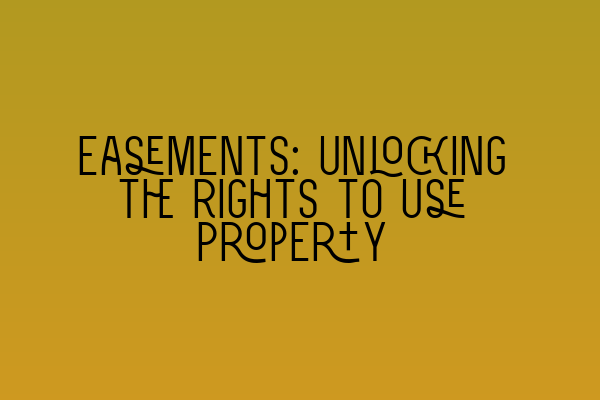Easements: Unlocking the Rights to Use Property
As a property owner or prospective buyer, it’s crucial to have a comprehensive understanding of your rights and obligations regarding the use of the property. One important aspect of property law that often gets overlooked is easements. In this blog post, we will dive deep into the world of easements, exploring what they are, why they are important, and how they can affect your property.
What is an Easement?
Simply put, an easement is a legal right granted to someone that allows them to use another person’s property, provided it is not owned by that person. Easements can be granted for various purposes, including access to a neighboring property, the installation and maintenance of utility lines, or even recreational uses such as fishing or hiking.
Types of Easements
There are several different types of easements to be aware of:
1. Right of Way Easement: This is the most common type of easement and grants someone the right to pass through another person’s property. It is often necessary when a property is landlocked and needs access to a public road.
2. Utility Easement: Utility companies often require easements to install and maintain power lines, water pipes, or sewer lines. These easements give the utility company the right to access the property for their specific purposes.
3. Conservation Easement: A conservation easement is designed to protect natural resources or preserve historically significant areas. It limits the development and use of the property to ensure its long-term conservation.
4. Recreational Easement: These easements allow the public or specific individuals to access a property for recreational purposes, such as hunting, fishing, or hiking. They are often created to provide public access to lakes, rivers, or scenic areas.
Why Easements Matters
Understanding and recognizing easements is essential for property owners and buyers, as they can significantly affect property use, value, and development plans. Here are some reasons why easements matter:
1. Property Access: Easements can ensure that you have legal access to your property, even if it is landlocked or surrounded by other privately owned lands.
2. Property Development: If your property has an existing easement, it can restrict your ability to build structures or make changes within the easement area. This can impact your plans for expansion or development.
3. Property Value: Easements, especially those that grant scenic or recreational access, can enhance the value of your property. Conversely, easements that limit development may reduce the property’s potential value.
4. Obligations and Responsibilities: Easements often come with responsibilities for the property owner, such as granting access, maintaining access roads, or ensuring the proper functioning of utility lines. It is important to be aware of these obligations and fulfill them accordingly.
Navigating Easements
When dealing with easements, it is vital to consult with an experienced property law solicitor. They can provide guidance on understanding existing easements, negotiating new easements, and resolving any disputes that may arise.
If you are buying a property, a thorough title review should investigate any existing easements and assess their impact on your intended use of the property. Also, be sure to inquire about any proposed easements that may be in the works, as they could affect your property in the future.
In conclusion, easements are an intricate aspect of property law that can significantly impact your property’s use, value, and development. By understanding the different types of easements, their implications, and your rights and obligations as a property owner, you can navigate the complexities of easements with confidence. Consult with a qualified property law solicitor to ensure that you make informed decisions when it comes to easements and protecting your property rights.
Disclaimer: The content provided in this blog post is for informational purposes only and should not be considered legal advice. For specific assistance regarding easements or any other legal matter, please consult with a professional solicitor.
